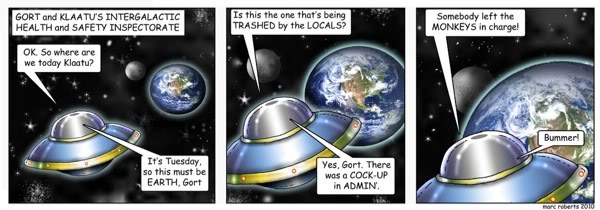
by Shaun Chamberlin | Feb 11, 2011 | All Posts, Cultural stories, Reviews and recommendations, The Transition Timeline, Transition Movement
The brilliant cartoonist Marc Roberts (whose work will be familiar to regular Dark Optimism readers) got in touch with the Transition Network last year offering to produce a strip exploring the Transition concept. The time has come for the results to be unleashed on an unsuspecting public!
In Marc's own words, "they will be loosely exploring some of the Holmgren and Chamberlin scenarios through my usual combination of toilet humour and sarcasm".
He does himself a disservice - for me, it's a real honour to see my work used by someone whose talents I have long admired and enjoyed.
Two cartoons will be released each week. This post will be updated with the new cartoons as they are released, and they will also go out on Rob Hopkins' Transition Culture site and on a Transition Network blog.
The first four (+ a special message from the Inspectorate) are below. Hope you enjoy them!
Mon 7 Feb
 (click to expand each strip)
(click to expand each strip)

Letter to Earthlings from the Intergalactic Heath & Safety Inspectorate
To whom it may concern,
Your planet has been selected for an extended audit by the Intergalactic Health & Safety Inspectorate, a worker-owned cooperative originating from a distant galaxy.
My colleague Gort and I have much work ahead and we will need to communicate our progress to you. Our studies of your culture indicate that your pictures paint a thousand words, so we will be using cartoons to convey our message.
We've therefore randomly selected an earthling to chronicle our adventures and given him special cartooning powers. He is working from a safe house deep in the discombobulation matrix and when our work here is done, we'll endeavour to return him to Manchester with most of his main parts intact.
So from now on, our adventures - starting below - will come to you in this medium.
And don't be alarmed if you see us on your doorstep, we may be making housecalls in your area shortly...
Yours intergalactically,
Klaatu
- Primitive Species Specialist, Dept of Planetary Remediation
- Intergalactic Health & Safety Inspectorate, Upsilon Andromedae Sector
Fri 11 Feb
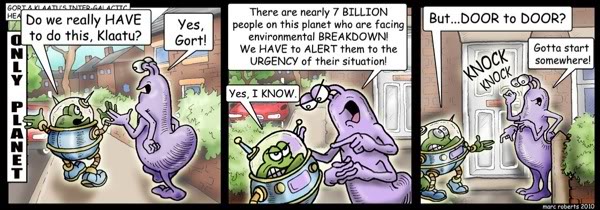
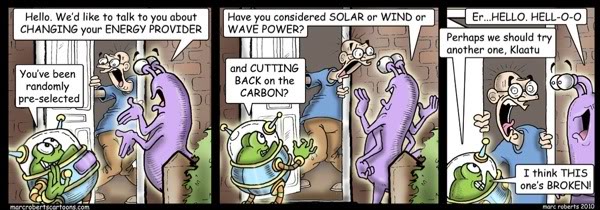
Mon 14 Feb
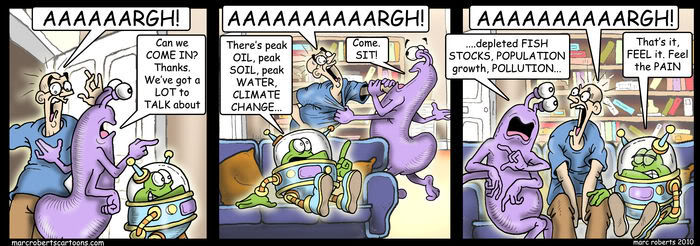

Fri 18 Feb
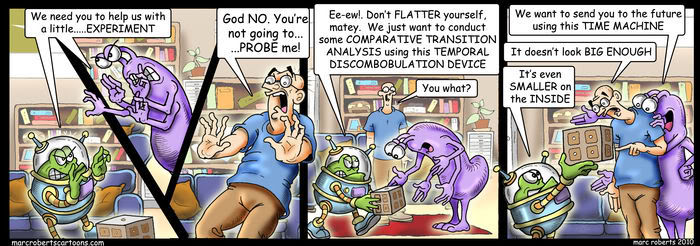
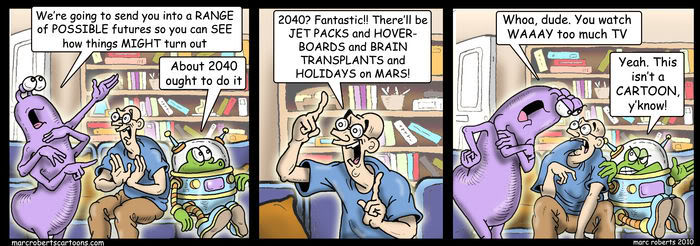
Mon 21 Feb
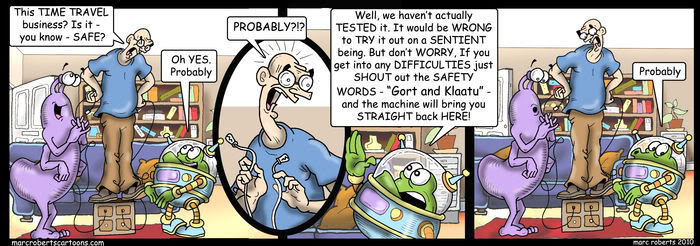
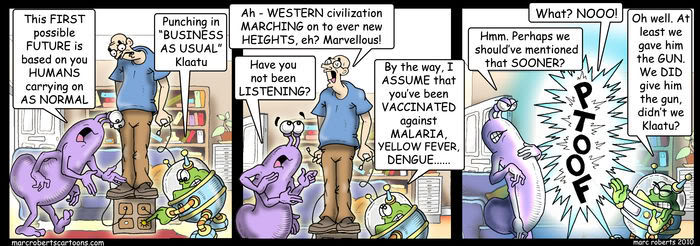
Mon 28 Feb
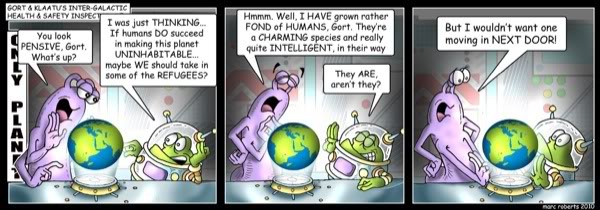

Mon 7 Mar
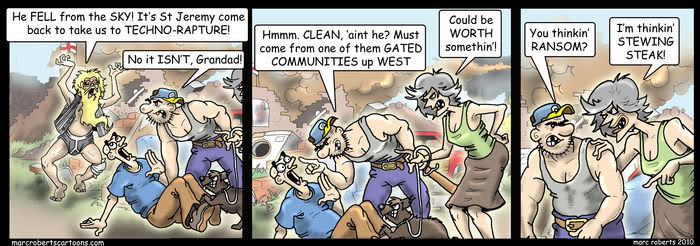
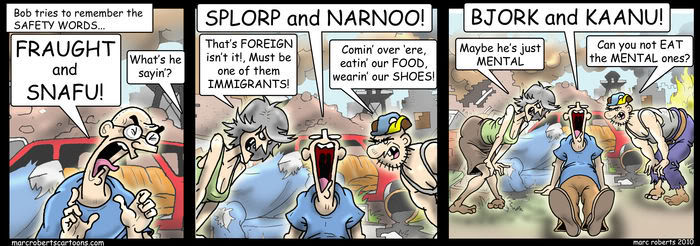
Mon 14 Mar
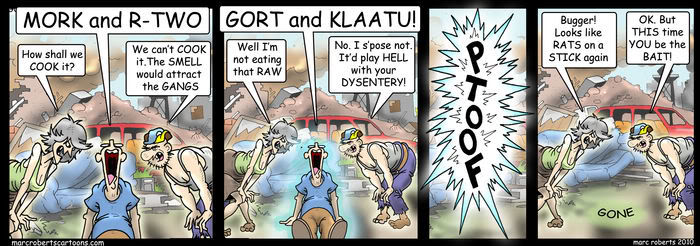

Mon 28 Mar
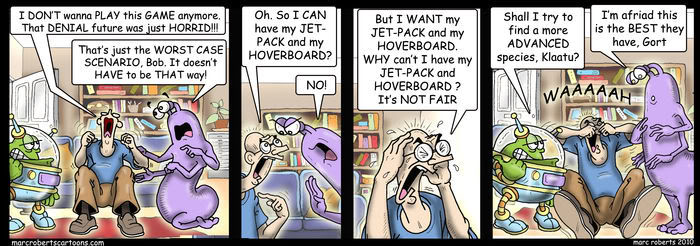

Mon 4 Apr
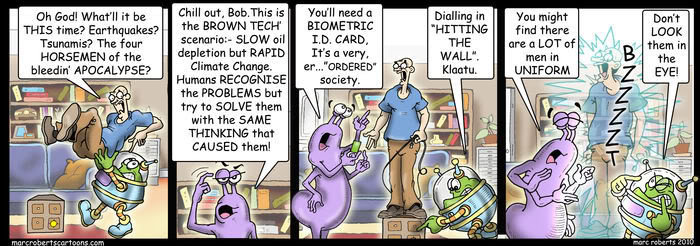
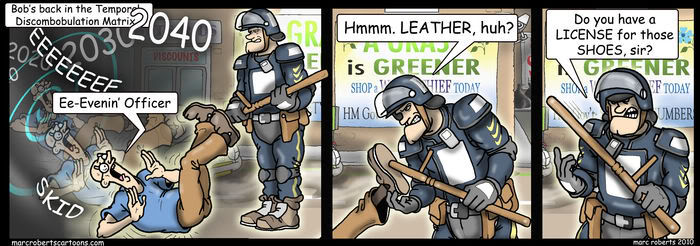
Mon 11 Apr

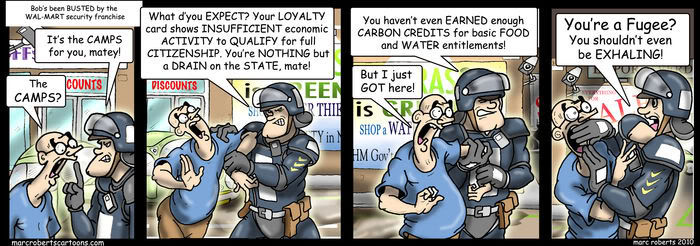
Mon 25 Apr
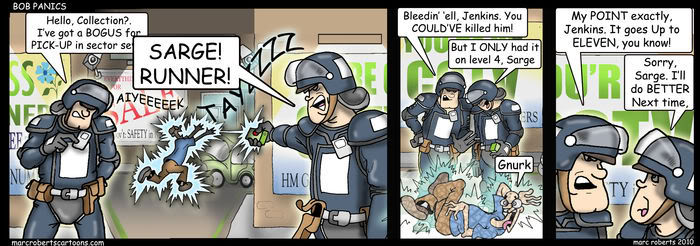
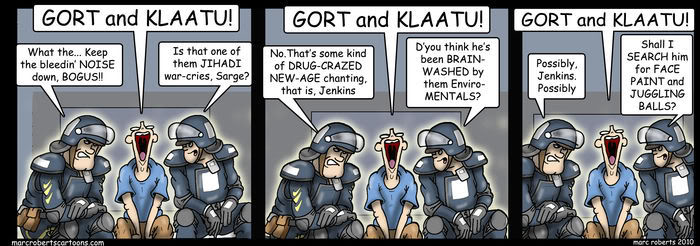
Mon 9 May
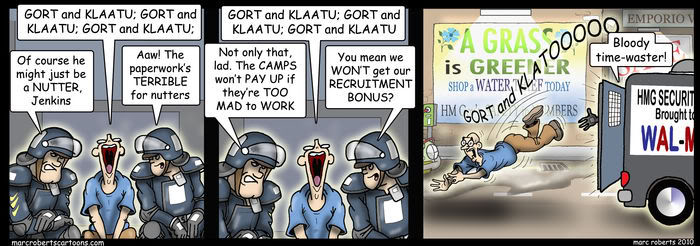

Mon 30 May

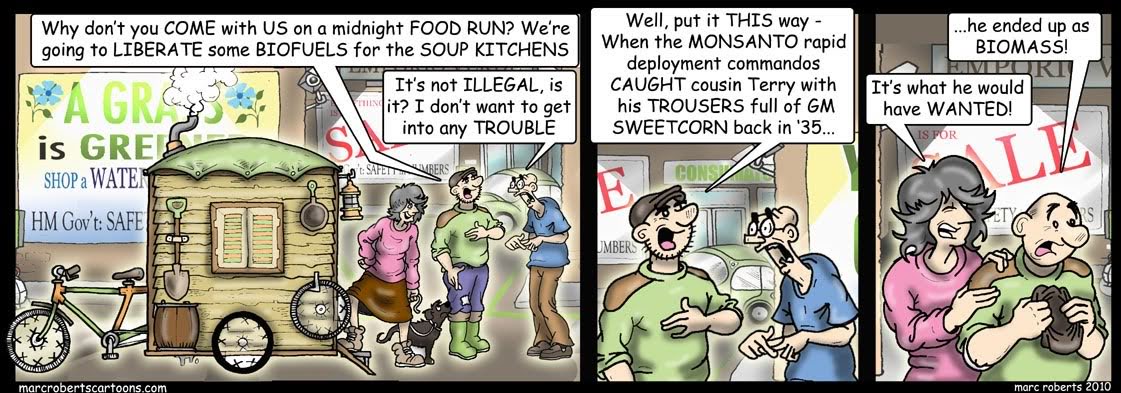
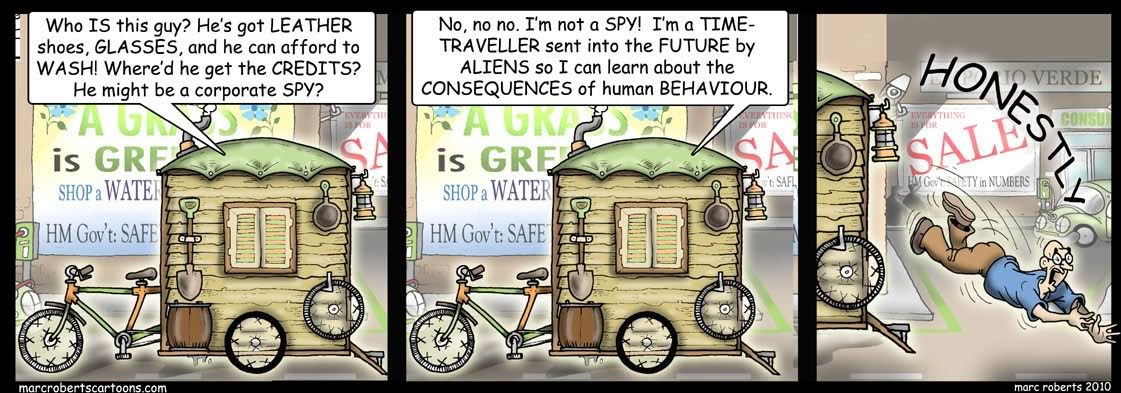

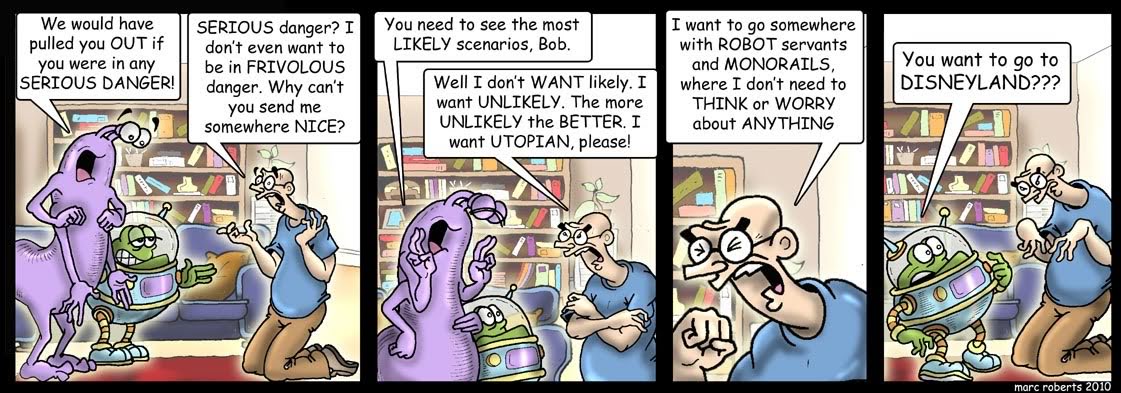
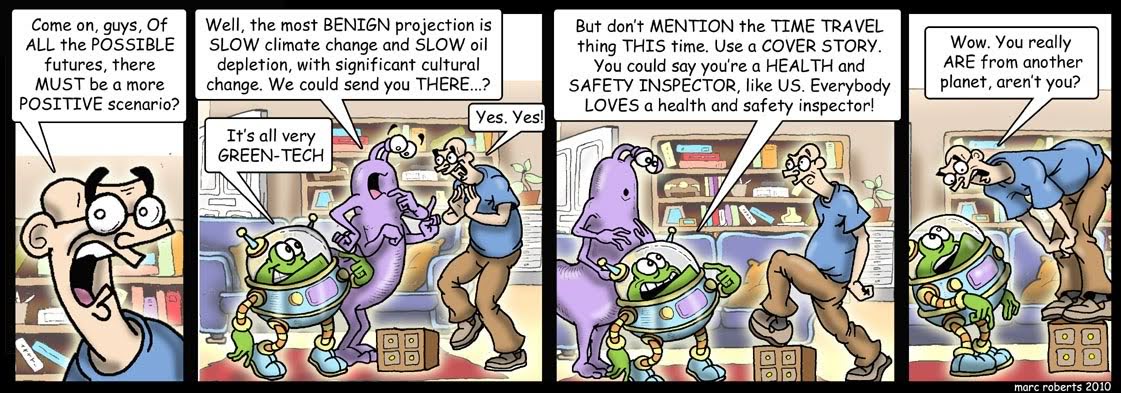
This is as far as Marc Roberts has drawn this story for now! Drop him a positive comment here if you'd like to see more!
Edit - Sun 4 Dec:
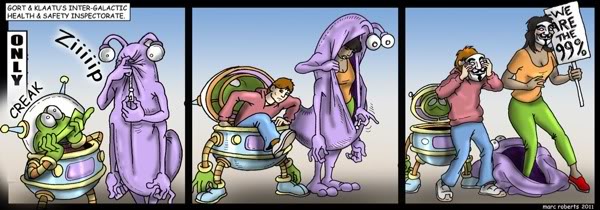
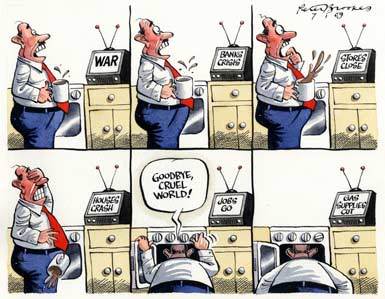
by Shaun Chamberlin | Jun 15, 2010 | All Posts, Economics, Favourite posts, Peak Oil, Transition Movement
This post was originally written by me as a guest post for Rob Hopkins' Transition Culture blog, but I have kindly given myself permission to reproduce it here ;)
So here I am. I fully intended to be giving the England match my full attention right now, but I've been left distinctly restive by this afternoon's long session by Stoneleigh of The Automatic Earth, and feel the need to put some thoughts down.
Including the extensive Q&A session her talk lasted virtually three hours and covered a lot of ground, starting from a good runthrough of the 'peak energy' situation, but quickly focusing in on finance, as she believes that this is the factor that will most dramatically shape our immediate future. Notably, the talk attracted almost half the attendees of the Transition Conference, despite the numerous other Open Space sessions taking place at the same time.
For me her analysis helped to bridge the gap between comprehension and real understanding. I always feel that I don't have a genuine opinion on something until I can listen to someone argue one point of view, then listen to someone argue the opposite, and truly understand what the root of their disagreement is, so that I can make up my own mind. With finance I have always felt unable to get to the root of the disagreement between those who forecast a cataclysm in the coming years, and those who argue that the system is far more resilient than some give it credit for.
That feeling has not been totally banished, but Stoneleigh (both today and in a bar-room chat until 2am last night) really helped me to close some big gaps.
She has agreed to email me her slides, but essentially her position is that we are just slipping over the edge into the greatest financial Depression the world has ever seen, off the back of the biggest financial bubble the world has ever seen. This will, of course, bring significant personal consequences for individuals, families and communities.
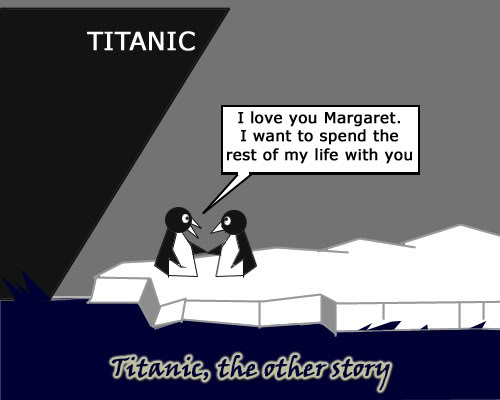 Consequently, her absolute #1 piece of advice to all and sundry is to get out of debt, as debts that may seem manageable now are unlikely to remain so as interest rates soar and property prices plummet (perhaps back to somewhere in the region of their 1970 values). Meanwhile, existing mortgage debts will stubbornly remain just as large, leaving many people in the ordeal of negative equity - their mortgage debt being bigger than the value of their house.
She also explained the 'derivatives' market in a usefully clear way. Whereas many of the world's money-making schemes are based on cutting the proverbial cake into smaller and smaller slices, this system is based on giving more and more people rights over a single slice of cake. As this system unravels (as it surely must at some point, since not every claimant can have their cake to eat it), the bulk of the world's money will essentially disappear, creating huge deflation. There will be less money in circulation relative to the amount of stuff, so the value of the money that people do have will actually go up, while earnings drop. As she pointed out, the key issue to be concerned with is 'affordability' not inflation, deflation, wages or anything else. How much useful stuff can you buy with what you have?
While not explicit about it as such, she seemed to be ranking the kinds of assets we might hold in terms of risk. In order, starting with the most desirable, that list was:
Useful assets - e.g. tools, land, a home that you want to live in, and that can supply what you need etc...
Cash - as deflation is likely to raise the value of cash, it's a good thing to have, but cash in bank accounts is quite liable to evaporate. In response to the inevitable question of where we should keep cash, her repeated answer was "be creative".
Gilts - Given that holding massive amounts of cash is both impractical and likely to arouse suspicion, she suggested gilts as the next least-risky place to put money.
Interestingly though, she believes that while useful productive assets are the most important thing (these are, after all, the source of our ability to support our communities and ourselves), she also pointed out that the price of such assets is likely to drop as the crisis tightens.
Consequently, her absolute #1 piece of advice to all and sundry is to get out of debt, as debts that may seem manageable now are unlikely to remain so as interest rates soar and property prices plummet (perhaps back to somewhere in the region of their 1970 values). Meanwhile, existing mortgage debts will stubbornly remain just as large, leaving many people in the ordeal of negative equity - their mortgage debt being bigger than the value of their house.
She also explained the 'derivatives' market in a usefully clear way. Whereas many of the world's money-making schemes are based on cutting the proverbial cake into smaller and smaller slices, this system is based on giving more and more people rights over a single slice of cake. As this system unravels (as it surely must at some point, since not every claimant can have their cake to eat it), the bulk of the world's money will essentially disappear, creating huge deflation. There will be less money in circulation relative to the amount of stuff, so the value of the money that people do have will actually go up, while earnings drop. As she pointed out, the key issue to be concerned with is 'affordability' not inflation, deflation, wages or anything else. How much useful stuff can you buy with what you have?
While not explicit about it as such, she seemed to be ranking the kinds of assets we might hold in terms of risk. In order, starting with the most desirable, that list was:
Useful assets - e.g. tools, land, a home that you want to live in, and that can supply what you need etc...
Cash - as deflation is likely to raise the value of cash, it's a good thing to have, but cash in bank accounts is quite liable to evaporate. In response to the inevitable question of where we should keep cash, her repeated answer was "be creative".
Gilts - Given that holding massive amounts of cash is both impractical and likely to arouse suspicion, she suggested gilts as the next least-risky place to put money.
Interestingly though, she believes that while useful productive assets are the most important thing (these are, after all, the source of our ability to support our communities and ourselves), she also pointed out that the price of such assets is likely to drop as the crisis tightens.
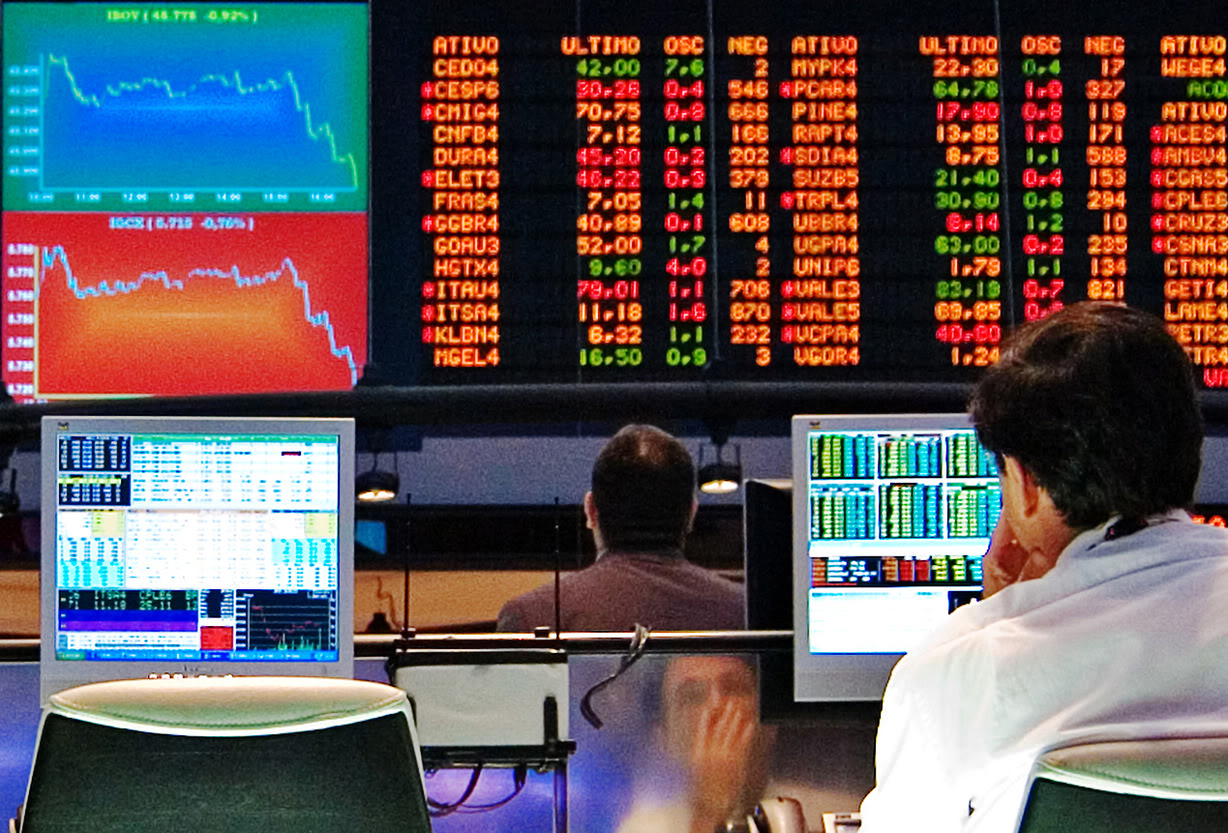 Accordingly, she counselled that one possible course of action for those unable to afford the productive assets they need (land, say) without going into debt, could be to minimise their exposure to the crash, preserve any cash that they can, and then buy more cheaply further down the slope. Those who can afford to buy outright now though, would be well-advised to do so, as while their assets, land etc. may decrease in value, this is of less significance if they plan to hold on to these assets long-term anyway, and in return they are buying themselves time to learn to use these 'tools', before they are relying on them.
As she spoke, the room was hushed and fiercely attentive, and you could see people absorbing the implications of what she said for their own financial plans, and those of their communities and families.
One very interesting question was from a Transitioner who is considering setting up a community-owned renewables project, based on taking out a loan to install PV, and paying back the loan on the basis of the Government's feed-in tariffs. Stoneleigh argued that in the current situation, any Government guarantee to do anything over the next 20-25 years is barely worth the paper it's written on, and so she would advise that such projects should be undertaken either without going into debt or not at all.
Above all, she stressed the urgency of the situation, and that we should not expect the financial situation to look at all like it does now in just a couple of years time.
Accordingly, she counselled that one possible course of action for those unable to afford the productive assets they need (land, say) without going into debt, could be to minimise their exposure to the crash, preserve any cash that they can, and then buy more cheaply further down the slope. Those who can afford to buy outright now though, would be well-advised to do so, as while their assets, land etc. may decrease in value, this is of less significance if they plan to hold on to these assets long-term anyway, and in return they are buying themselves time to learn to use these 'tools', before they are relying on them.
As she spoke, the room was hushed and fiercely attentive, and you could see people absorbing the implications of what she said for their own financial plans, and those of their communities and families.
One very interesting question was from a Transitioner who is considering setting up a community-owned renewables project, based on taking out a loan to install PV, and paying back the loan on the basis of the Government's feed-in tariffs. Stoneleigh argued that in the current situation, any Government guarantee to do anything over the next 20-25 years is barely worth the paper it's written on, and so she would advise that such projects should be undertaken either without going into debt or not at all.
Above all, she stressed the urgency of the situation, and that we should not expect the financial situation to look at all like it does now in just a couple of years time.
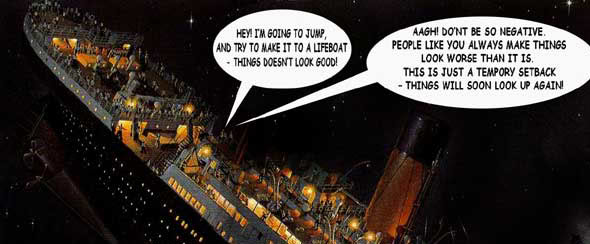 In my one-to-one chat with her on Friday night, I asked her about my Student Loan, which is currently about the most benign loan imaginable, with a rate of interest generally lower than that available on tax-free savings accounts. She argued that I should pay it off as soon as possible nonetheless, even if that takes all the money I have, as savings in the bank are at a significant risk of disappearing, whereas loans never die. Indeed, they tend to be sold on down the line until you find yourself in debt to someone rather unpleasant.
We also talked about the best ways forward, given the difficult situation in which we find ourselves. We both believe that social ties are the most valuable asset we can possibly have, and that building these networks of trust is the most important work we can do.
She spoke of the example of the Great Depression of the 1930s, in which despite an abundance of food, fuel, resources and manpower, the whole system ground to a halt due to the unavailability of money to connect buyers and sellers. It reached the point where farmers were pouring away perfectly good milk while people starved up the road.
This put me in mind of Mark Boyle, the Moneyless Man, who I finally met for the first time at the Uncivilisation festival a couple of weeks ago. It strikes me that the simple idea of the gift economy - or Freeconomy - that he is practising, is exactly what was needed in that situation. If the farmers and the hungry had trusted each other, then without money, or indeed any other kind of transaction, a human can give another human food just for the love of it. And if the farmer needed help on his farm, then others might help for similar reasons. Perhaps if those needs coincide then barter might take place, but where they do not, the simple desire to help each other, and the trust that others will help out when you need something, could have got that society functioning again.
In my one-to-one chat with her on Friday night, I asked her about my Student Loan, which is currently about the most benign loan imaginable, with a rate of interest generally lower than that available on tax-free savings accounts. She argued that I should pay it off as soon as possible nonetheless, even if that takes all the money I have, as savings in the bank are at a significant risk of disappearing, whereas loans never die. Indeed, they tend to be sold on down the line until you find yourself in debt to someone rather unpleasant.
We also talked about the best ways forward, given the difficult situation in which we find ourselves. We both believe that social ties are the most valuable asset we can possibly have, and that building these networks of trust is the most important work we can do.
She spoke of the example of the Great Depression of the 1930s, in which despite an abundance of food, fuel, resources and manpower, the whole system ground to a halt due to the unavailability of money to connect buyers and sellers. It reached the point where farmers were pouring away perfectly good milk while people starved up the road.
This put me in mind of Mark Boyle, the Moneyless Man, who I finally met for the first time at the Uncivilisation festival a couple of weeks ago. It strikes me that the simple idea of the gift economy - or Freeconomy - that he is practising, is exactly what was needed in that situation. If the farmers and the hungry had trusted each other, then without money, or indeed any other kind of transaction, a human can give another human food just for the love of it. And if the farmer needed help on his farm, then others might help for similar reasons. Perhaps if those needs coincide then barter might take place, but where they do not, the simple desire to help each other, and the trust that others will help out when you need something, could have got that society functioning again.
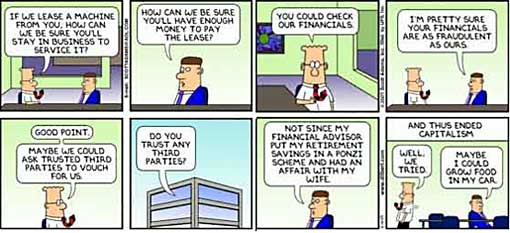 But as Stoneleigh pointed out, the key is building that trust ahead of time. In difficult times, your bonds with those you trust naturally becomes even tighter, as you rely on each other more, but your mistrust for those outside your circle can also increase, as you worry that perhaps they are just after what little you have.
Transition has always sought to widen and strengthen those circles, and that still looks like the most important work we can be doing, but Stoneleigh hopes to suggest a few tweaks to our tactics, as well as underscoring the sense of urgency.
A number of other Transitioners have already spoken to me about being rather shaken by Stoneleigh's talk, but as she kept emphasising, we are doing the right work. Critical work.
(Edit - 03/10/10 Stoneleigh's powerful talk is now available for purchase here.)
ps And England drew 1-1, but somehow that doesn't seem like the most important thing I learnt today!
But as Stoneleigh pointed out, the key is building that trust ahead of time. In difficult times, your bonds with those you trust naturally becomes even tighter, as you rely on each other more, but your mistrust for those outside your circle can also increase, as you worry that perhaps they are just after what little you have.
Transition has always sought to widen and strengthen those circles, and that still looks like the most important work we can be doing, but Stoneleigh hopes to suggest a few tweaks to our tactics, as well as underscoring the sense of urgency.
A number of other Transitioners have already spoken to me about being rather shaken by Stoneleigh's talk, but as she kept emphasising, we are doing the right work. Critical work.
(Edit - 03/10/10 Stoneleigh's powerful talk is now available for purchase here.)
ps And England drew 1-1, but somehow that doesn't seem like the most important thing I learnt today!
 Shaun is a co-founder of Transition Town Kingston and the author of The Transition Timeline. He writes at www.darkoptimism.org
Shaun is a co-founder of Transition Town Kingston and the author of The Transition Timeline. He writes at www.darkoptimism.org
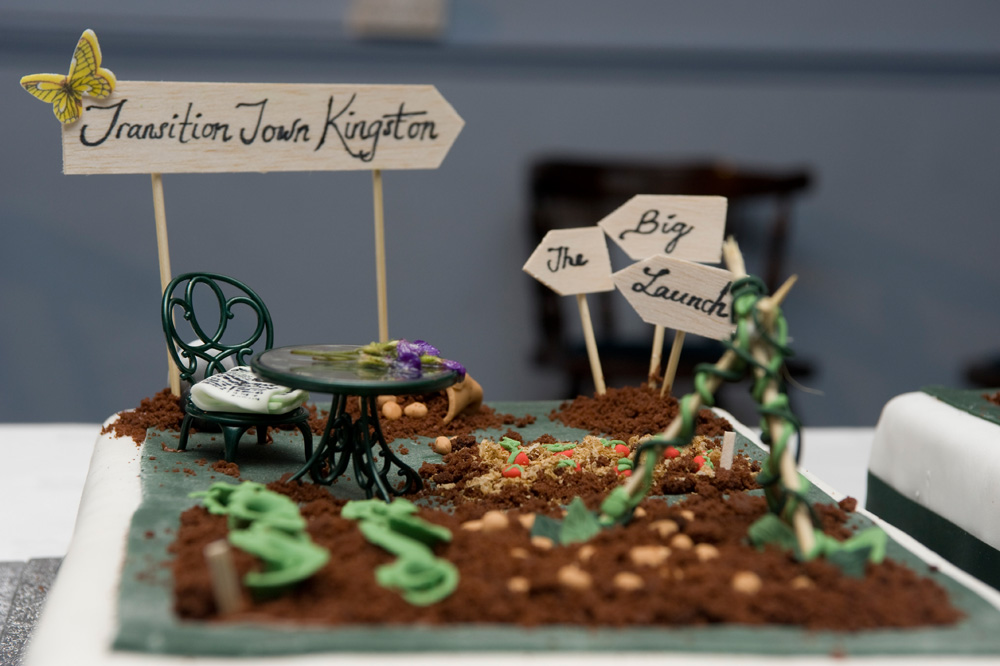
by Shaun Chamberlin | Apr 20, 2010 | All Posts, Favourite posts, Transition Movement
So the big day finally came and went, and glorious it was too. I'm still smiling from the wonderful energy of it all. Pause a moment to take in the brilliance of the TTK cake (TT Kake?) before clicking through to a peek at the many-splendoured event itself, including a chance to see the accomplished and inspired short movie of TTK's story to date that premièred on the night.
The energy levels never dropped after the buzz of the children's hour that kicked the day off, with gleeful kids seeing a real bee hive, making puppets out of plastic bags, writing poetry, getting faces painted etc etc while the parents browsed the stalls of local green businesses and organisations...
 Next, local inspiration Robin Hutchinson entertainingly introduced talks from our local MPs (although this close to the election he had to describe them as "Parliamentary candidates who you may remember from their previous jobs"!), our mayor, the head of the Council, me and the ever-entertaining David Fleming, back by popular demand, who hesitated to despoil the cake by doing us the honour of cutting it.
Next, local inspiration Robin Hutchinson entertainingly introduced talks from our local MPs (although this close to the election he had to describe them as "Parliamentary candidates who you may remember from their previous jobs"!), our mayor, the head of the Council, me and the ever-entertaining David Fleming, back by popular demand, who hesitated to despoil the cake by doing us the honour of cutting it.
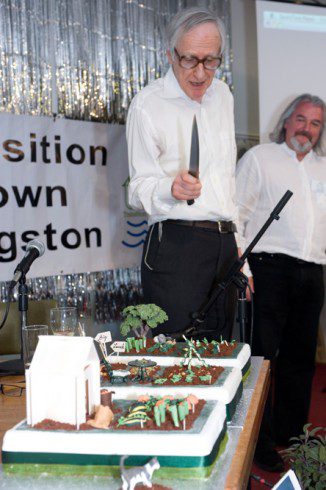 We also received a congratulatory video message from Rob Hopkins before a planned Open Space session, in which we faced the real challenge of getting everyone to stop having passionate, deeply involved conversations long enough so that we could explain to them how wonderfully Open Space could facilitate such conversations.
With Prisca Baron singing to a rapt audience of children and adults alike, DJ Matt providing the soundtrack late into the night and Toni Izard and family laying on an amazing spread of food and refreshments, it felt like a real triumph of community spirit, with smiles on the faces of old stalwarts and total newcomers alike.
We also received a congratulatory video message from Rob Hopkins before a planned Open Space session, in which we faced the real challenge of getting everyone to stop having passionate, deeply involved conversations long enough so that we could explain to them how wonderfully Open Space could facilitate such conversations.
With Prisca Baron singing to a rapt audience of children and adults alike, DJ Matt providing the soundtrack late into the night and Toni Izard and family laying on an amazing spread of food and refreshments, it felt like a real triumph of community spirit, with smiles on the faces of old stalwarts and total newcomers alike.
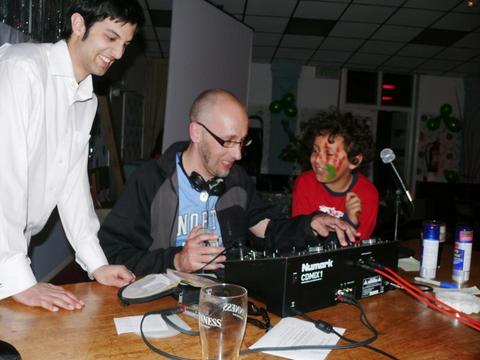 I didn't manage to get a handle on the numbers there (perhaps 250??), but it was great to see so many unfamiliar faces mingling happily, and contributing to the Kingston Timeline that we pinned to the wall (see some of the ideas it produced here).
Even the venue itself felt like a new ally, as almost everyone attending had never set foot in Kingston Working Men's Club before, despite its location tucked away right in the heart of Kingston. A great many more people know it's there now, and hopefully a few lasting connections have been forged.
For me personally, the two particular highlights in a night of delights were the deliciously brilliant (and brilliantly delicious!) cake - or actually three cakes - and the TTK movie. Credit for the first, and for the photos featured here, goes to our talented trio Libby, Jonny and Maria, AKA Caking Agent.
I didn't manage to get a handle on the numbers there (perhaps 250??), but it was great to see so many unfamiliar faces mingling happily, and contributing to the Kingston Timeline that we pinned to the wall (see some of the ideas it produced here).
Even the venue itself felt like a new ally, as almost everyone attending had never set foot in Kingston Working Men's Club before, despite its location tucked away right in the heart of Kingston. A great many more people know it's there now, and hopefully a few lasting connections have been forged.
For me personally, the two particular highlights in a night of delights were the deliciously brilliant (and brilliantly delicious!) cake - or actually three cakes - and the TTK movie. Credit for the first, and for the photos featured here, goes to our talented trio Libby, Jonny and Maria, AKA Caking Agent.
 The second was the work of Elise Toogood and Nick Barron of Tenth Egg, and you can see it in all its glory below. As both cake and film were only finished in the early hours of the morning of the event, both were genuine surprises even for those of us heavily involved in pulling the event together.
Films at their best have a wonderful way of evoking a sense of overarching narrative, and for me personally it was a delight to feel this as I watched it. Despite knowing all of the projects featured - or perhaps because of that - it was deeply satisfying to see the different threads pulled together into this tapestry.
Many thanks too to those who organised the surprise for the six of us on TTK's Temporary Steering Group, pulling us on stage to present each of us with our very own blueberry bush! It would be impossible to mention everyone who made the event possible, but hopefully they all enjoyed it as much as I did.
I will add more photos below as they come in, including the happy crowds and impressive before and after pics from the decoration efforts on Friday evening.
My apologies if this post is rather excitable - I can only confess that I'm still excited! Just as an Unleashing should, this has reminded me what a marvellous community I live in, and feels like a historic launchpad to a happier, more thrivacious Kingston!
[caption id="attachment_1933" align="alignnone" width="480"]
The second was the work of Elise Toogood and Nick Barron of Tenth Egg, and you can see it in all its glory below. As both cake and film were only finished in the early hours of the morning of the event, both were genuine surprises even for those of us heavily involved in pulling the event together.
Films at their best have a wonderful way of evoking a sense of overarching narrative, and for me personally it was a delight to feel this as I watched it. Despite knowing all of the projects featured - or perhaps because of that - it was deeply satisfying to see the different threads pulled together into this tapestry.
Many thanks too to those who organised the surprise for the six of us on TTK's Temporary Steering Group, pulling us on stage to present each of us with our very own blueberry bush! It would be impossible to mention everyone who made the event possible, but hopefully they all enjoyed it as much as I did.
I will add more photos below as they come in, including the happy crowds and impressive before and after pics from the decoration efforts on Friday evening.
My apologies if this post is rather excitable - I can only confess that I'm still excited! Just as an Unleashing should, this has reminded me what a marvellous community I live in, and feels like a historic launchpad to a happier, more thrivacious Kingston!
[caption id="attachment_1933" align="alignnone" width="480"] picture courtesy of Simone Kay[/caption]
picture courtesy of Simone Kay[/caption]

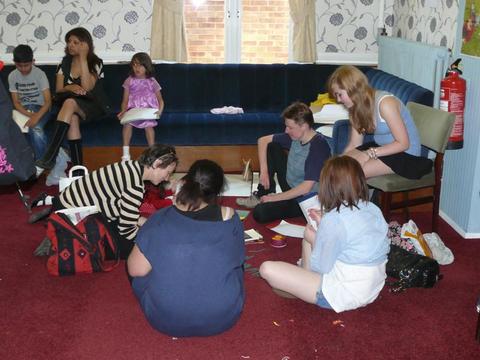 Poetry workshop
Poetry workshop
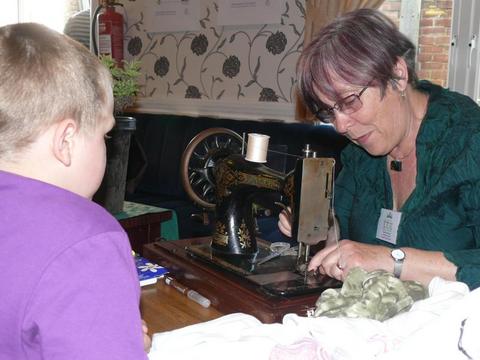
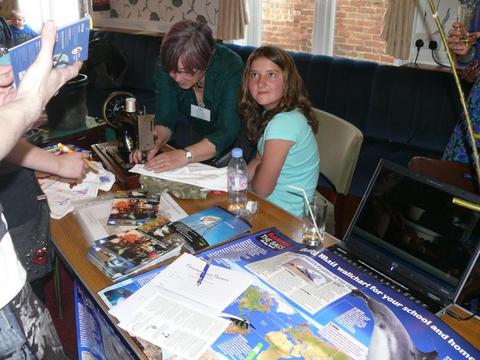 [caption id="attachment_1934" align="aligncenter" width="320"]
[caption id="attachment_1934" align="aligncenter" width="320"] Bags created on the day, picture courtesy of Simone Kay[/caption]
Bags created on the day, picture courtesy of Simone Kay[/caption]
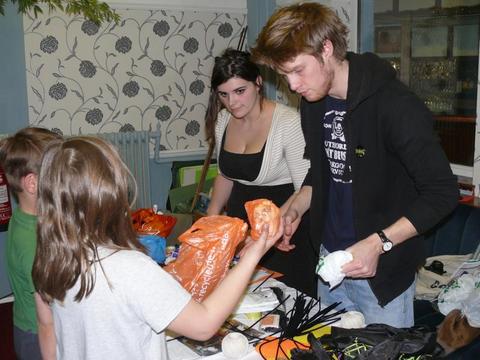 Making puppets from plastic bags
Making puppets from plastic bags
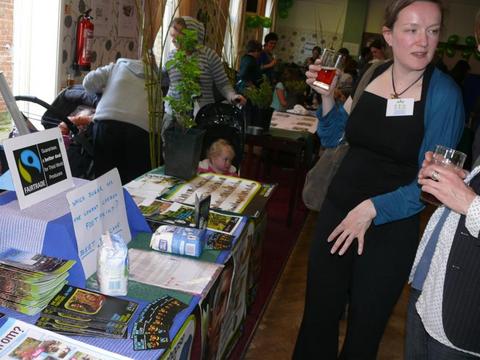
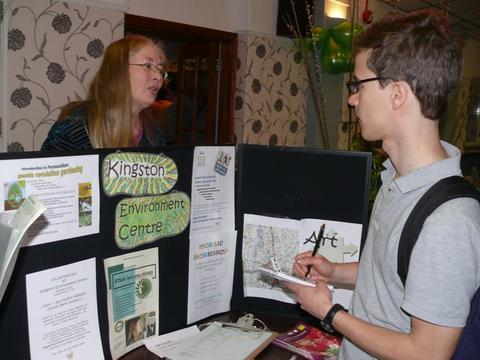
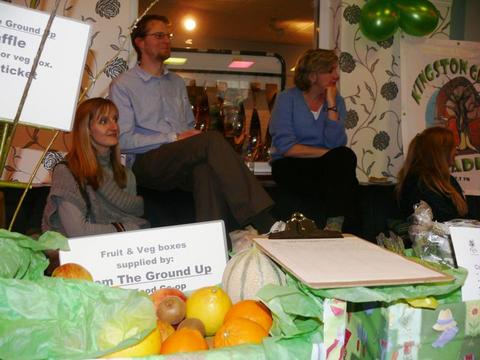
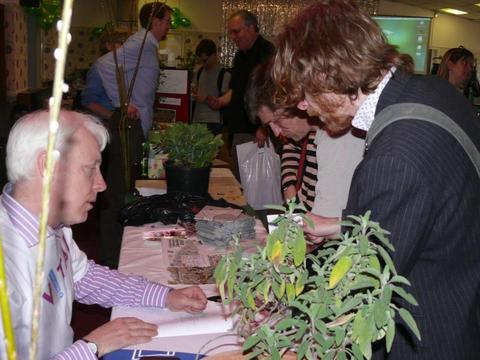
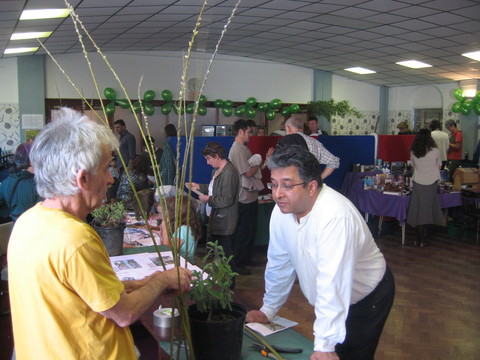
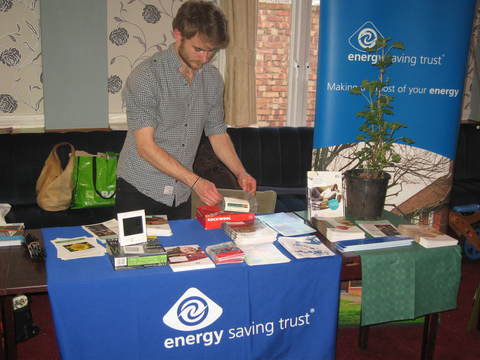
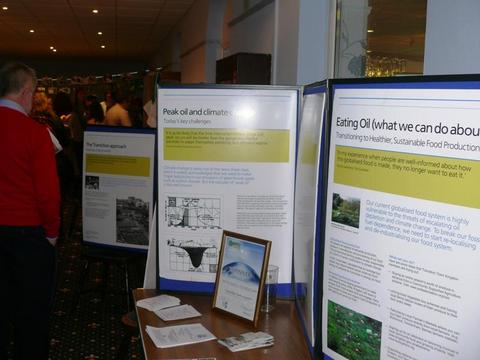 Stalls and info from TTK groups, local businesses and organisations
Stalls and info from TTK groups, local businesses and organisations
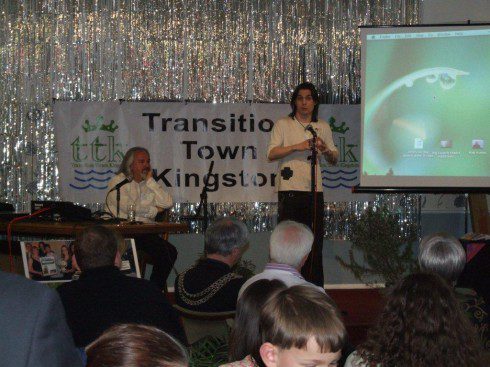
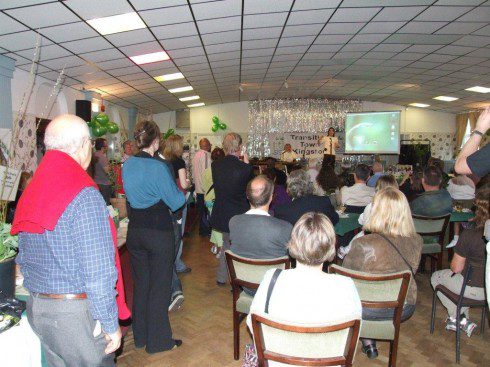 Me speaking about the origins of Transition and TTK
Me speaking about the origins of Transition and TTK
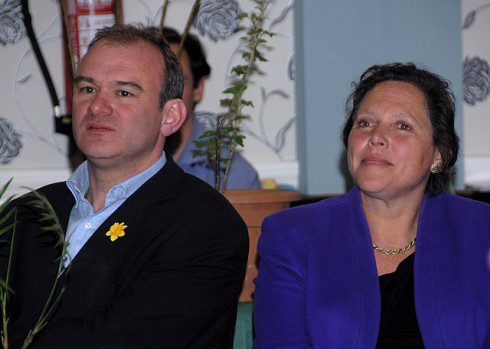 Our local MPs, Ed Davey and Susan Kramer
Our local MPs, Ed Davey and Susan Kramer
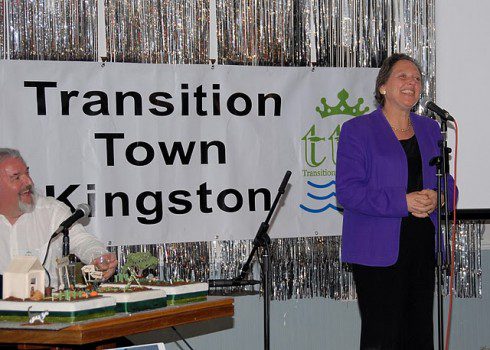
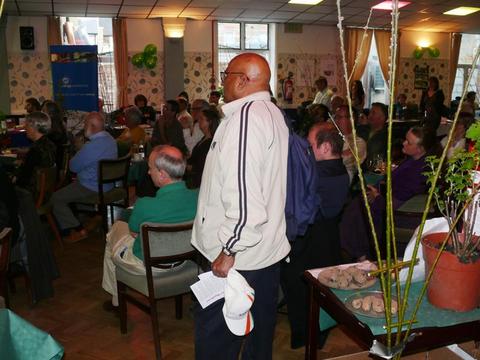
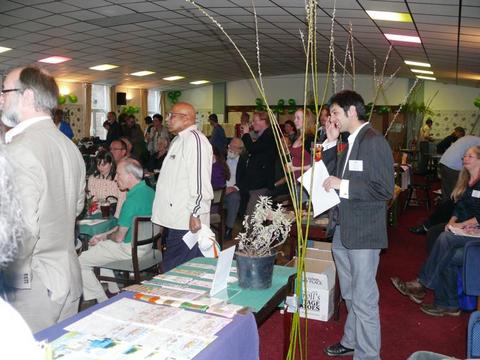
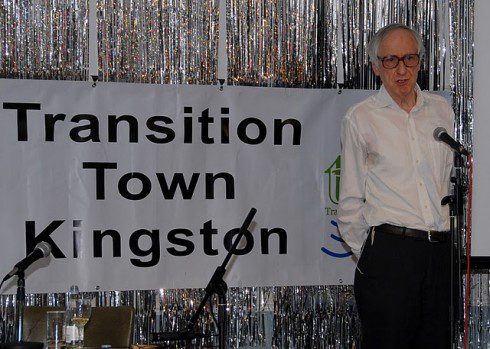 David Fleming speaking
David Fleming speaking
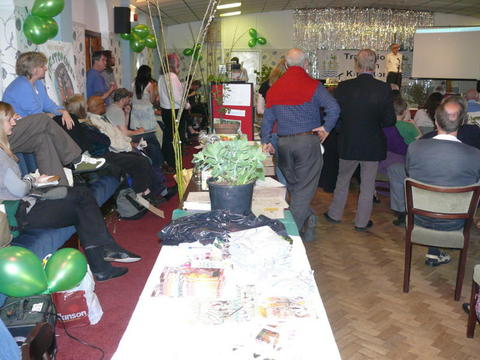
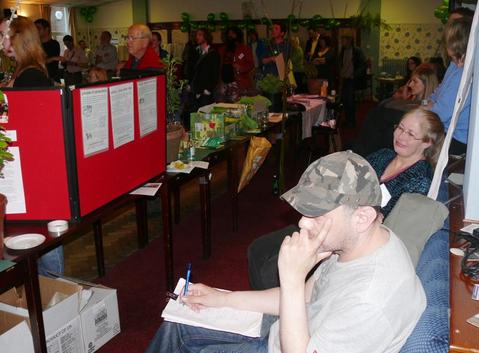

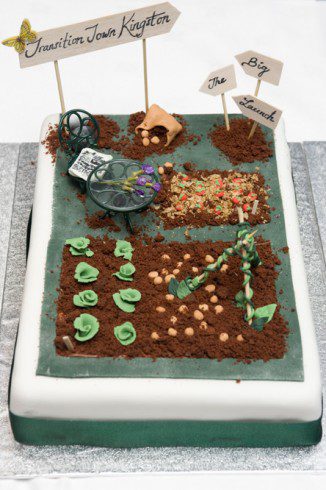
 Closeups of the magnificent cake
Closeups of the magnificent cake
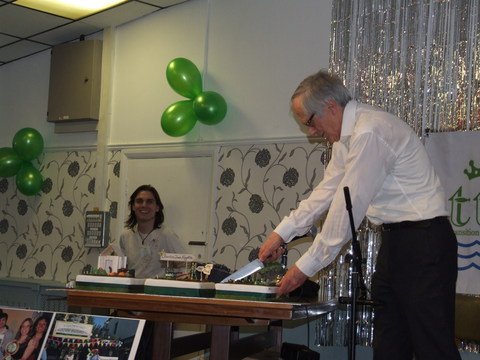 David Fleming does the honours
David Fleming does the honours
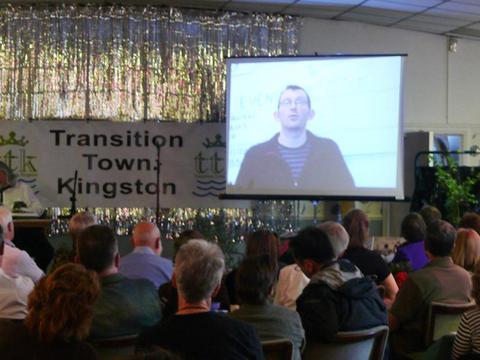 Rob Hopkins' video message
Rob Hopkins' video message
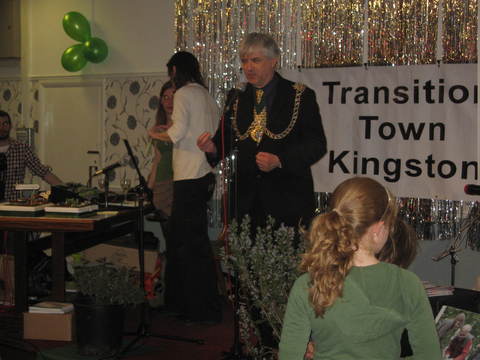 Kingston's Mayor addresses the crowd
Kingston's Mayor addresses the crowd
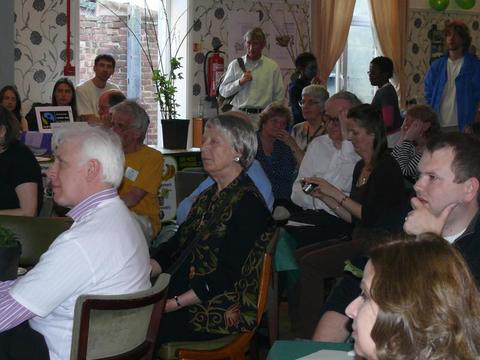
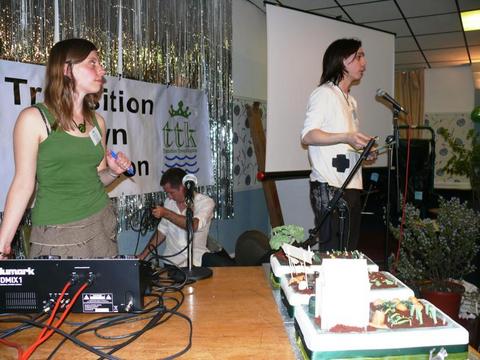 Organising the Open Space, raffle etc.
Organising the Open Space, raffle etc.
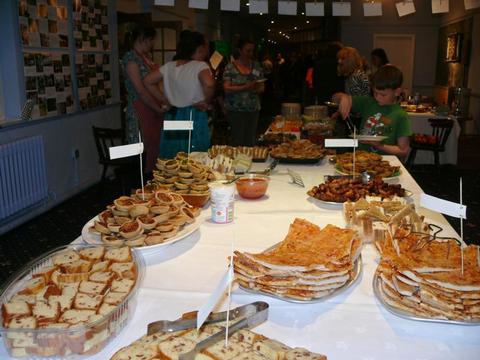
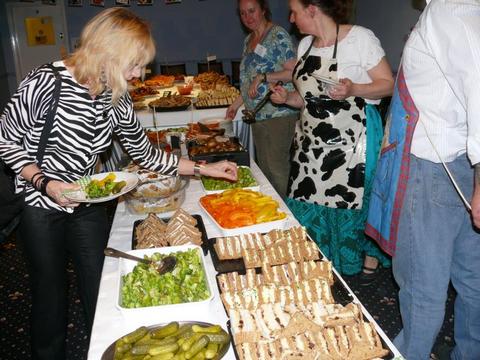 The fantastic spread put on by Toni Izard and family
The fantastic spread put on by Toni Izard and family

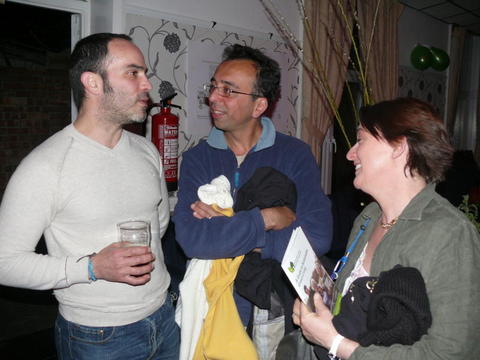
 Prisca Baron singing
Prisca Baron singing
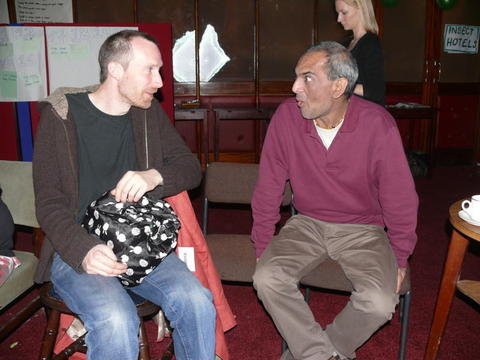
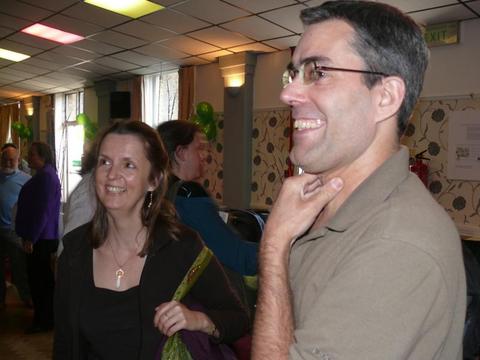 Visitors from other Transition initiatives
Visitors from other Transition initiatives
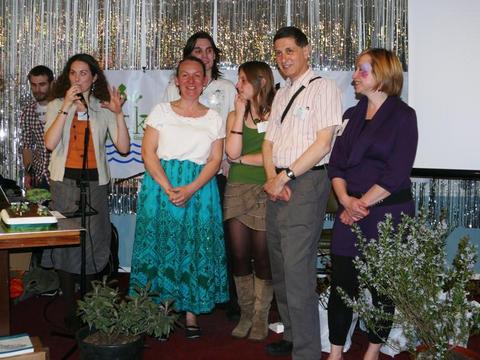
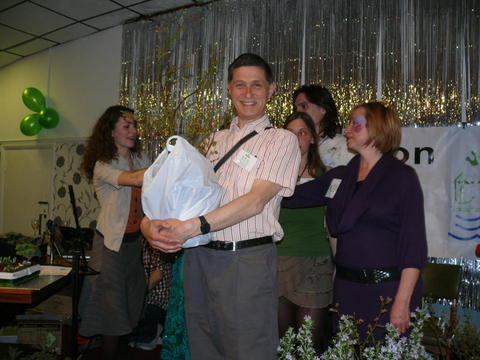 TTK give a gift to the Steering Group - thanks all!
TTK give a gift to the Steering Group - thanks all!
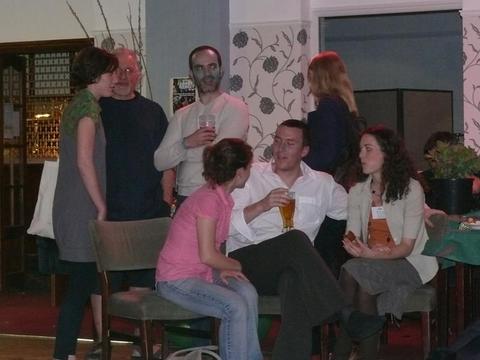
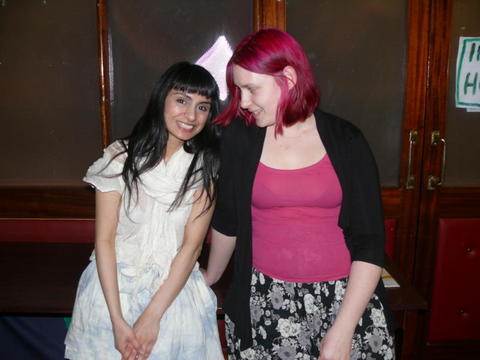 Libby and Maria - two of the cake conjurers!
Libby and Maria - two of the cake conjurers!

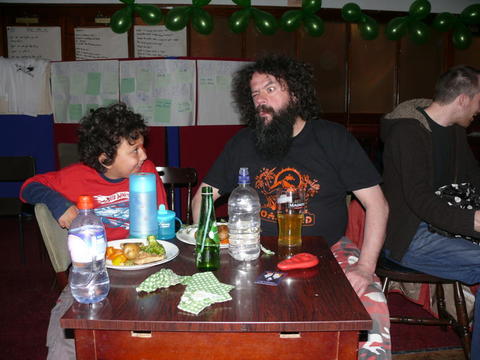
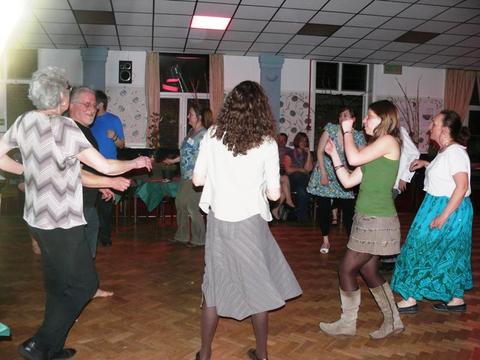 Dancing late into the night
Dancing late into the night
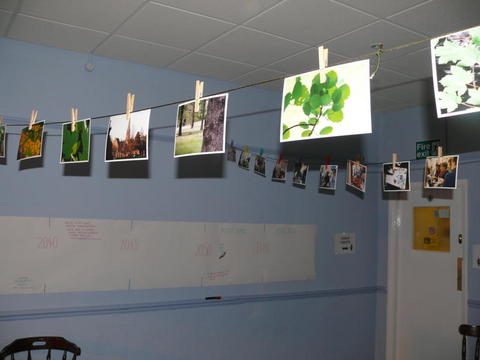
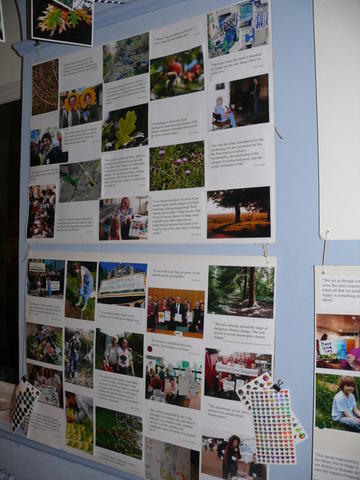 Photos from TTK's history to date, mixed with relevant and inspiring quotes
Photos from TTK's history to date, mixed with relevant and inspiring quotes
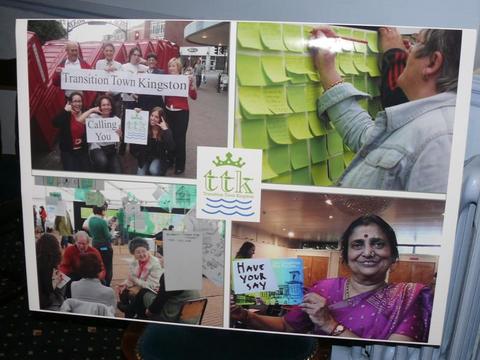
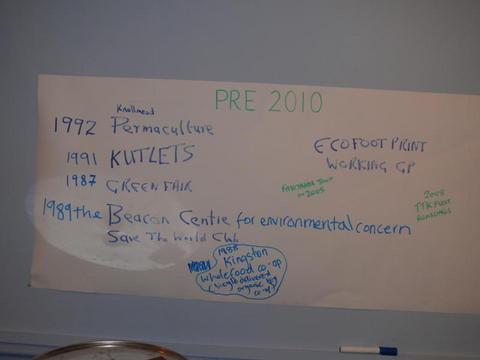
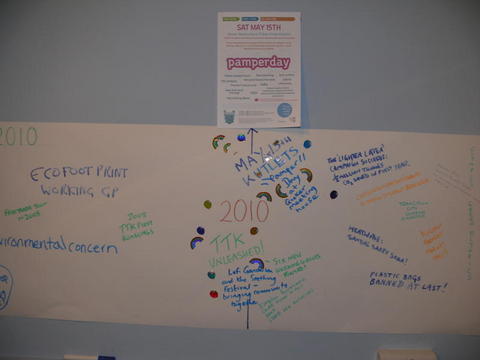
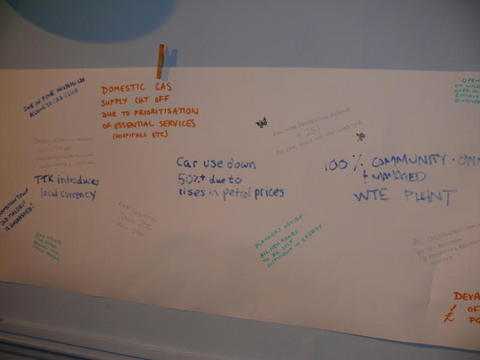
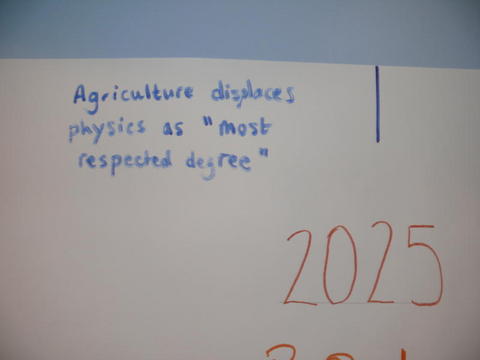
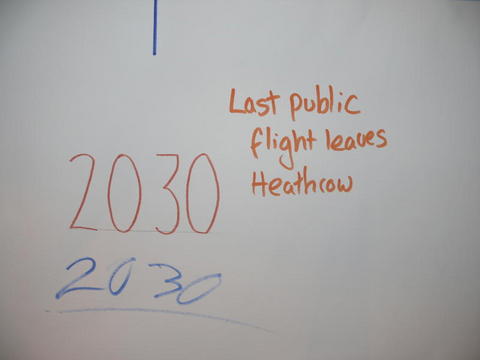
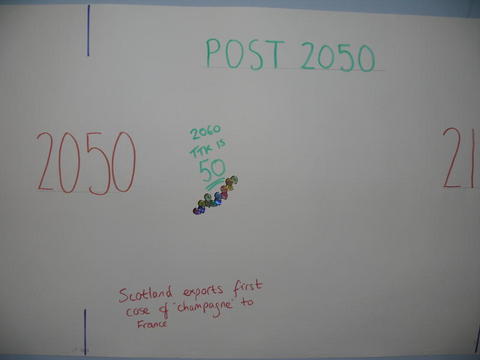 The Kingston timeline, created by Big Launch attendees
The Kingston timeline, created by Big Launch attendees
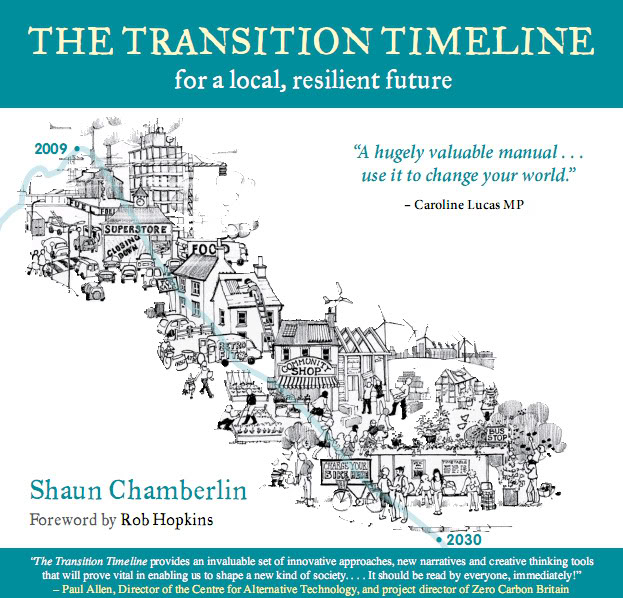
by Shaun Chamberlin | Apr 15, 2009 | All Posts, Favourite posts, Reviews and recommendations, The Transition Timeline, Transition Movement
The last month has been a bit of a blur, with very well-attended book launch events all over Britain, a two-day seminar at the Centre for Alternative Technology scoping out Zero Carbon Britain 2, more radio interviews, and even being caught on film for the first time (more practice required methinks!).
While I've been zipping around, a number of people have requested a more detailed write-up on The Transition Timeline than I have so far provided online, so let's take a closer look.
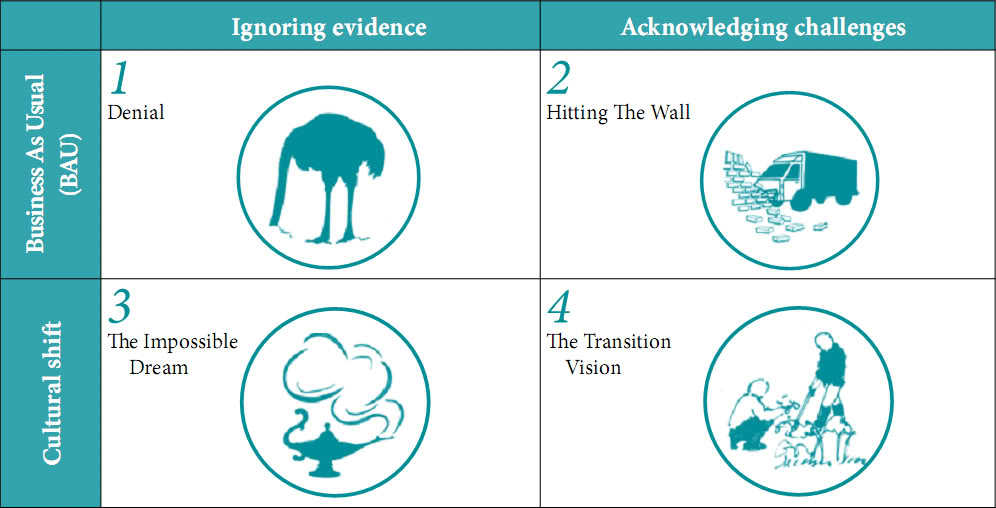 In overview, then, the first half of the book explores four different visions of how the next twenty years could pan out for the UK and world, before focusing on what might be considered the most desirable of these, the Transition Vision, and examining the practical details of this in depth. There is also a chapter here provided by Rob Hopkins, the originator of the Transition movement, in which he outlines the progress Transition initiatives have made to date, and provides a set of tools for communities working towards their local Energy Descent Action Plans (a key aspect of the Transition process).
The second half of the book provides a thoroughly researched yet readable exploration of the latest evidence and thinking on climate change and peak oil, and the interactions between the two, including a section focused on their present and future impacts in the UK, and on our Government's responses to date.
In overview, then, the first half of the book explores four different visions of how the next twenty years could pan out for the UK and world, before focusing on what might be considered the most desirable of these, the Transition Vision, and examining the practical details of this in depth. There is also a chapter here provided by Rob Hopkins, the originator of the Transition movement, in which he outlines the progress Transition initiatives have made to date, and provides a set of tools for communities working towards their local Energy Descent Action Plans (a key aspect of the Transition process).
The second half of the book provides a thoroughly researched yet readable exploration of the latest evidence and thinking on climate change and peak oil, and the interactions between the two, including a section focused on their present and future impacts in the UK, and on our Government's responses to date.
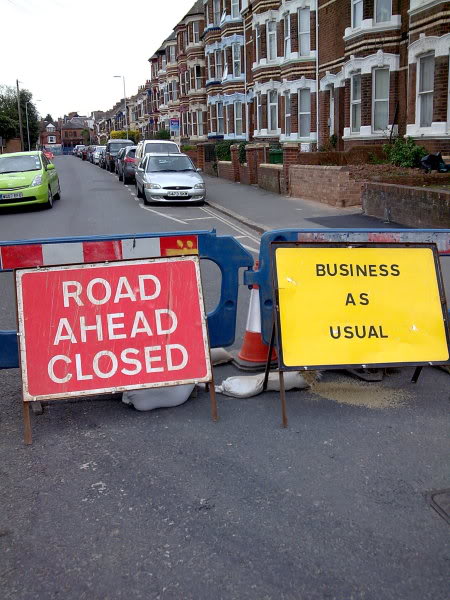 The book itself initially grew out of three motivations. Firstly, it was requested by existing Transition initiatives, who were trying to produce realistic positive visions of the future for their communities, but needed some input on the major trends facing the UK in our near-future – the kinds of things which are going to affect them but which may be hard for individual communities to directly affect (e.g. peak oil, government policy or UK food supply). Accordingly, the book provides a readable summary of the existing research in key areas of concern (e.g. population, food and water, energy, healthcare...), outlining the present position and trends before exploring possible futures.
The second impetus for the book was my personal concern about whether the Transition process is adequate to dealing with the sheer scale of the challenges we collectively face. This is a theme that runs throughout the book, as the process of writing was intimately bound up with my own exploration of this.
The final energy behind the book's creation was the desire to flesh out the Transition Vision. This concept was touched on in Rob's Transition Handbook, but Rob and I felt strongly that it needed to be developed further. Core to Transition is the idea that we need a positive realistic vision of the future to get us all out of bed in the morning, and I was very keen to make this feel more tangible and real by exploring the possibilities and challenges in more detail.
The book itself initially grew out of three motivations. Firstly, it was requested by existing Transition initiatives, who were trying to produce realistic positive visions of the future for their communities, but needed some input on the major trends facing the UK in our near-future – the kinds of things which are going to affect them but which may be hard for individual communities to directly affect (e.g. peak oil, government policy or UK food supply). Accordingly, the book provides a readable summary of the existing research in key areas of concern (e.g. population, food and water, energy, healthcare...), outlining the present position and trends before exploring possible futures.
The second impetus for the book was my personal concern about whether the Transition process is adequate to dealing with the sheer scale of the challenges we collectively face. This is a theme that runs throughout the book, as the process of writing was intimately bound up with my own exploration of this.
The final energy behind the book's creation was the desire to flesh out the Transition Vision. This concept was touched on in Rob's Transition Handbook, but Rob and I felt strongly that it needed to be developed further. Core to Transition is the idea that we need a positive realistic vision of the future to get us all out of bed in the morning, and I was very keen to make this feel more tangible and real by exploring the possibilities and challenges in more detail.
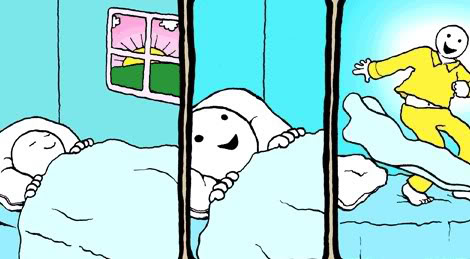 This importance of this was reinforced for me mid-way through the drafting process when the Age of Stupid team brought a sneak preview of their film to the Transition Conference last year. The response was generally that it was a brilliant film, but that it was still focused on the "Denial" scenario and the awful places that could lead, without showing the audience the positive alternative.
Franny Armstrong, the film's director, agreed, and challenged us to flesh out that alternative vision to set alongside her film, so that people could clearly perceive the real choices we face. Those discussions stayed with me throughout the drafting process, and ultimately led to the tie-in between the launch of the film and the book, and Franny's comment that: "There is obviously no single, magic bullet solution to climate change. But if I was forced to choose one – our best hope of averting the crisis – it would definitely be Transition Towns."
This importance of this was reinforced for me mid-way through the drafting process when the Age of Stupid team brought a sneak preview of their film to the Transition Conference last year. The response was generally that it was a brilliant film, but that it was still focused on the "Denial" scenario and the awful places that could lead, without showing the audience the positive alternative.
Franny Armstrong, the film's director, agreed, and challenged us to flesh out that alternative vision to set alongside her film, so that people could clearly perceive the real choices we face. Those discussions stayed with me throughout the drafting process, and ultimately led to the tie-in between the launch of the film and the book, and Franny's comment that: "There is obviously no single, magic bullet solution to climate change. But if I was forced to choose one – our best hope of averting the crisis – it would definitely be Transition Towns."
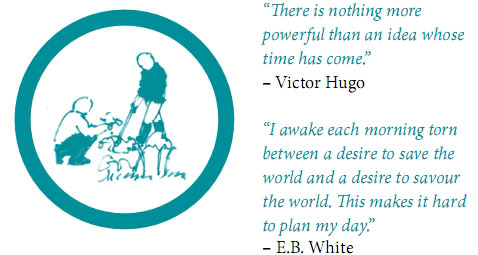 The Transition Vision we developed, then, is of a future in which we create a resilient, more localised society which avoids the worst potential of climate change and peak oil through building thriving lower-energy communities teeming with satisfying lifestyles and fulfilled people.
In the book I track this vision through a 'history of the next twenty years', examining population, demographics, food, water, energy, transport and healthcare, and then drawing together the common threads which appear to run through our near-future in all of these areas.
I should emphasise at this point that as the author I make no claim to any 'ownership' of this vision or timeline. It was developed in collaboration with as many Transitioners as I could manage to speak to, and represents and supports the learning and practical progress of the Transition movement as it continues to spread and mature. Now that I have pulled together a first draft, the never-ending process of developing the vision of the future we want to co-create for our communities and world is intended to continue as a collaborative project. This has already begun over at the Transition Forums, and in the near-future we plan to put the content of my book up on Appropedia, so that as many people as possible can collaborate in developing the second edition, just as has already been done with The Transition Handbook. We need as many heads, hearts and hands as possible working on our best responses to this unprecedented historical situation.
For me personally, one thing that has come out of the many long train journeys that I have taken this month has been a chance to actually read my own book! That may sound strange, but I found it is a very different experience to approach the book as a general reader than as a writer, proofreader etc. From this new perspective it seemed to me that the graph reproduced below represents perhaps the core shift in cultural perspective underlying the Transition Vision - that there is not a simple direct relationship between consumption and fulfilment.
The Transition Vision we developed, then, is of a future in which we create a resilient, more localised society which avoids the worst potential of climate change and peak oil through building thriving lower-energy communities teeming with satisfying lifestyles and fulfilled people.
In the book I track this vision through a 'history of the next twenty years', examining population, demographics, food, water, energy, transport and healthcare, and then drawing together the common threads which appear to run through our near-future in all of these areas.
I should emphasise at this point that as the author I make no claim to any 'ownership' of this vision or timeline. It was developed in collaboration with as many Transitioners as I could manage to speak to, and represents and supports the learning and practical progress of the Transition movement as it continues to spread and mature. Now that I have pulled together a first draft, the never-ending process of developing the vision of the future we want to co-create for our communities and world is intended to continue as a collaborative project. This has already begun over at the Transition Forums, and in the near-future we plan to put the content of my book up on Appropedia, so that as many people as possible can collaborate in developing the second edition, just as has already been done with The Transition Handbook. We need as many heads, hearts and hands as possible working on our best responses to this unprecedented historical situation.
For me personally, one thing that has come out of the many long train journeys that I have taken this month has been a chance to actually read my own book! That may sound strange, but I found it is a very different experience to approach the book as a general reader than as a writer, proofreader etc. From this new perspective it seemed to me that the graph reproduced below represents perhaps the core shift in cultural perspective underlying the Transition Vision - that there is not a simple direct relationship between consumption and fulfilment.
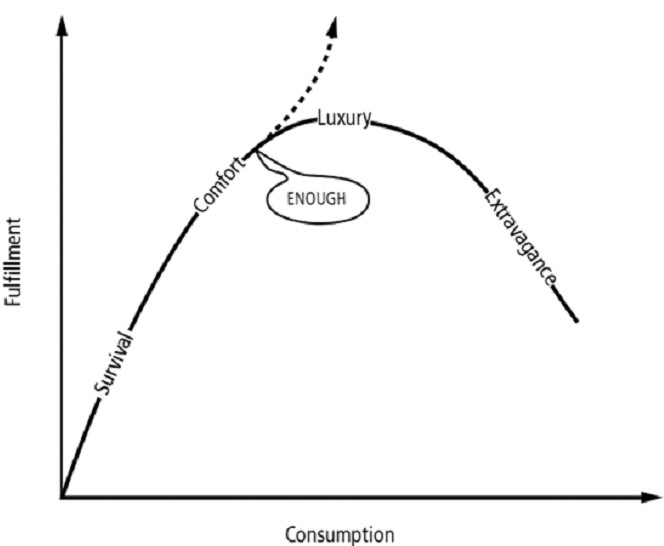 Reading through, and relying on my earlier research legwork, I found it was easy enough to trace our society's progression along this curve in each of the areas examined in the book, but what really struck me was the shift in the underlying message of this graph. I originally found the image in the 2002 essay The Great Transition, which in turn credits the 1992 book Your Money or Your Life, and the concepts behind it clearly hold a far longer heritage than that, yet there is a distinctly modern twist. While this graph used to make perhaps a fairly abstract point about the nature of fulfilment and well-being, in our modern world we can recognise that continuing on down the path of ever-greater consumption of energy and material resources now not only leads to lower levels of heartfelt satisfaction, but also to environmental devastation, massive mortality rates and widespread outright misery.
Working on The Transition Timeline has made it ever clearer to me that our choice now is between taking perhaps our last chance to enjoy a far happier, more satisfying world, or experiencing a vastly less desirable one - more of the same simply isn't an option. Here I am put in mind of Paul Wellstone's words, "If we don't fight hard enough for the things we stand for, at some point we have to recognise that we don't really stand for them".
This book was written for those communities who have already taken the brave decision to work for the future we all hope to live in, and I very much hope that it fills its intended role as a key tool supporting them - I feel privileged to have been entrusted with it.
--
Edit - for the range of online reviews and the opportunity to support my work by ordering a signed copy see here.
Reading through, and relying on my earlier research legwork, I found it was easy enough to trace our society's progression along this curve in each of the areas examined in the book, but what really struck me was the shift in the underlying message of this graph. I originally found the image in the 2002 essay The Great Transition, which in turn credits the 1992 book Your Money or Your Life, and the concepts behind it clearly hold a far longer heritage than that, yet there is a distinctly modern twist. While this graph used to make perhaps a fairly abstract point about the nature of fulfilment and well-being, in our modern world we can recognise that continuing on down the path of ever-greater consumption of energy and material resources now not only leads to lower levels of heartfelt satisfaction, but also to environmental devastation, massive mortality rates and widespread outright misery.
Working on The Transition Timeline has made it ever clearer to me that our choice now is between taking perhaps our last chance to enjoy a far happier, more satisfying world, or experiencing a vastly less desirable one - more of the same simply isn't an option. Here I am put in mind of Paul Wellstone's words, "If we don't fight hard enough for the things we stand for, at some point we have to recognise that we don't really stand for them".
This book was written for those communities who have already taken the brave decision to work for the future we all hope to live in, and I very much hope that it fills its intended role as a key tool supporting them - I feel privileged to have been entrusted with it.
--
Edit - for the range of online reviews and the opportunity to support my work by ordering a signed copy see here.
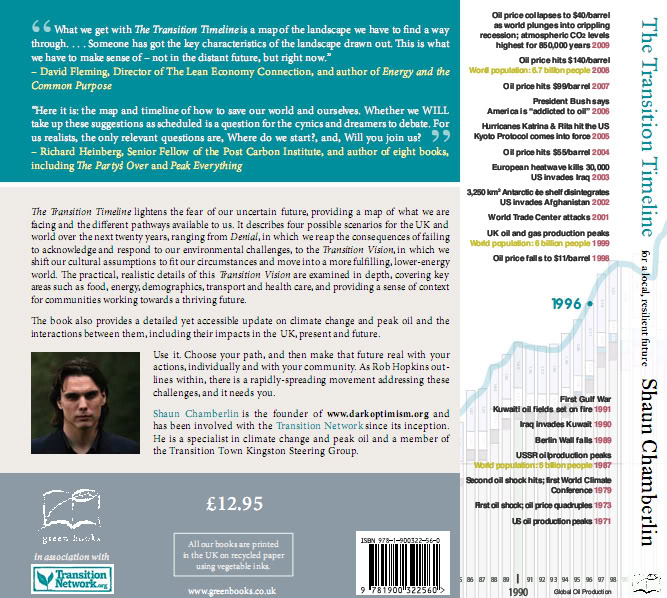 “Peak oil and climate change are two of the greatest challenges we face today; the Transition Town movement is firmly rooted in the idea that people taking action now in their communities can not only tackle these environmental threats but also, in the process of doing so, lead more fulfilling lives. It is about hope in an otherwise bleak seeming future. Above all, it's about the power of an alternative vision for how society could be and not waiting for government or politicians to get it right.
The Transition Timeline is designed to bring that vision to life – with stories of what communities have already achieved, with updates on the latest scientific data, and with ‘maps’ that highlight key landmarks on the journey towards a zero carbon future. It's a hugely valuable manual for anyone committed to turning dreams into reality. Don't just read this book – use it to change your world.”
~ Caroline Lucas MP, leader of the Green Party of England and Wales, and co-author of Green Alternatives to Globalisation: A Manifesto.
--
“Shaun Chamberlin ties down the uncertainties about climate, energy, food, water and population, the big scene-setters of our future, with no-nonsense authority. What we get with The Transition Timeline is a map of the landscape we have to find a way through. Map-making is a risky business: sooner or later someone is going to use your map and come across a treacherous swamp that isn’t marked. So you need to be alert to revisions and reports from travellers. But what matters is that someone has got the key characteristics of the landscape drawn out. This is what we have to make sense of – not in the distant future, but right now.
Don't set out without The Transition Timeline. Take a biro. Scribble updates, comments, expressions of shock and horror, notes to cheer yourself up. By the time your copy has been rained on, stained with blackberry juice, consulted, annotated, used to press and preserve a leaf of our autumnal world, you will have a good idea of where you are, and inspiration about where you are going. It is almost as good as getting there.”
~ Dr. David Fleming, director of The Lean Economy Connection, and author of Energy and the Common Purpose
--
“There is obviously no single, magic bullet solution to climate change. But if I was forced to choose one – our best hope of averting the crisis – it would definitely be Transition Towns.”
~ Franny Armstrong, Director of The Age of Stupid film
--
“Transition has emerged as perhaps the only real model we have for addressing our current crisis – a new, if vital, format for reconsidering our future. The Transition Timeline strengthens a fragile form, something that might, without a trace of irony, be called one of the last, best hopes for all of us.”
~ Sharon Astyk, author of Depletion and Abundance: Life on the New Home Front and A Nation of Farmers: Defeating the Food Crisis on American Soil
--
“Will the future be as rosy as The Transition Timeline suggests it might be? Will the people of Britain and the rest of the world begin immediately to make better decisions, taking the welfare of future generations into account? The answer to both questions is probably no.
Will serious repercussions of decisions already taken (regarding fossil fuel consumption and the structuring of our economy to depend on perpetual growth for its viability) come to bite us hard before we even have a chance to implement some of the excellent recommendations contained in this book? The answer to that one is certainly yes - we are already seeing dire consequences of past economic and energy decisions.
Nevertheless, without a vision of what can be, there is no alternative to a future completely constrained by the past. The ideal future set forth herein is not a useless pipe-dream. There is not a single outcome described in this book that could not realistically be achieved IF we all do things beginning now that are entirely within our ability to do.
So here it is: the map and timeline of how to save our world and ourselves. Whether we WILL take up these suggestions as scheduled is a question for the cynics and dreamers to debate. For us realists, the only relevant questions are, Where do we start?, and, Will you join us? ”
~ Richard Heinberg, Senior fellow of the Post Carbon Institute, and author of eight books, including The Party’s Over and Peak Everything
--
“The next 100 months will be a very special time for humanity. On numerous fronts, the consequences of the past 150 years of industrialisation are all simultaneously coming home to roost. Even senior experts, scientists, NGOs and political leaders fail to appreciate that the most recent evidence reveals a situation more urgent than had been expected, even by those who have been following it closely for decades. The Transition Timeline provides an invaluable set of innovative approaches, new narratives and creative thinking tools that will prove vital in enabling us to shape a new kind of society and a new kind of economy; stable in the long term, locally resilient, but still active in a global context, rich in quality jobs, a strong sense of purpose and reliant on indigenous, in-exhaustible energy. It should be read by everyone, immediately!”
~ Paul Allen, director of the Centre for Alternative Technology, and project director of Zero Carbon Britain
“Peak oil and climate change are two of the greatest challenges we face today; the Transition Town movement is firmly rooted in the idea that people taking action now in their communities can not only tackle these environmental threats but also, in the process of doing so, lead more fulfilling lives. It is about hope in an otherwise bleak seeming future. Above all, it's about the power of an alternative vision for how society could be and not waiting for government or politicians to get it right.
The Transition Timeline is designed to bring that vision to life – with stories of what communities have already achieved, with updates on the latest scientific data, and with ‘maps’ that highlight key landmarks on the journey towards a zero carbon future. It's a hugely valuable manual for anyone committed to turning dreams into reality. Don't just read this book – use it to change your world.”
~ Caroline Lucas MP, leader of the Green Party of England and Wales, and co-author of Green Alternatives to Globalisation: A Manifesto.
--
“Shaun Chamberlin ties down the uncertainties about climate, energy, food, water and population, the big scene-setters of our future, with no-nonsense authority. What we get with The Transition Timeline is a map of the landscape we have to find a way through. Map-making is a risky business: sooner or later someone is going to use your map and come across a treacherous swamp that isn’t marked. So you need to be alert to revisions and reports from travellers. But what matters is that someone has got the key characteristics of the landscape drawn out. This is what we have to make sense of – not in the distant future, but right now.
Don't set out without The Transition Timeline. Take a biro. Scribble updates, comments, expressions of shock and horror, notes to cheer yourself up. By the time your copy has been rained on, stained with blackberry juice, consulted, annotated, used to press and preserve a leaf of our autumnal world, you will have a good idea of where you are, and inspiration about where you are going. It is almost as good as getting there.”
~ Dr. David Fleming, director of The Lean Economy Connection, and author of Energy and the Common Purpose
--
“There is obviously no single, magic bullet solution to climate change. But if I was forced to choose one – our best hope of averting the crisis – it would definitely be Transition Towns.”
~ Franny Armstrong, Director of The Age of Stupid film
--
“Transition has emerged as perhaps the only real model we have for addressing our current crisis – a new, if vital, format for reconsidering our future. The Transition Timeline strengthens a fragile form, something that might, without a trace of irony, be called one of the last, best hopes for all of us.”
~ Sharon Astyk, author of Depletion and Abundance: Life on the New Home Front and A Nation of Farmers: Defeating the Food Crisis on American Soil
--
“Will the future be as rosy as The Transition Timeline suggests it might be? Will the people of Britain and the rest of the world begin immediately to make better decisions, taking the welfare of future generations into account? The answer to both questions is probably no.
Will serious repercussions of decisions already taken (regarding fossil fuel consumption and the structuring of our economy to depend on perpetual growth for its viability) come to bite us hard before we even have a chance to implement some of the excellent recommendations contained in this book? The answer to that one is certainly yes - we are already seeing dire consequences of past economic and energy decisions.
Nevertheless, without a vision of what can be, there is no alternative to a future completely constrained by the past. The ideal future set forth herein is not a useless pipe-dream. There is not a single outcome described in this book that could not realistically be achieved IF we all do things beginning now that are entirely within our ability to do.
So here it is: the map and timeline of how to save our world and ourselves. Whether we WILL take up these suggestions as scheduled is a question for the cynics and dreamers to debate. For us realists, the only relevant questions are, Where do we start?, and, Will you join us? ”
~ Richard Heinberg, Senior fellow of the Post Carbon Institute, and author of eight books, including The Party’s Over and Peak Everything
--
“The next 100 months will be a very special time for humanity. On numerous fronts, the consequences of the past 150 years of industrialisation are all simultaneously coming home to roost. Even senior experts, scientists, NGOs and political leaders fail to appreciate that the most recent evidence reveals a situation more urgent than had been expected, even by those who have been following it closely for decades. The Transition Timeline provides an invaluable set of innovative approaches, new narratives and creative thinking tools that will prove vital in enabling us to shape a new kind of society and a new kind of economy; stable in the long term, locally resilient, but still active in a global context, rich in quality jobs, a strong sense of purpose and reliant on indigenous, in-exhaustible energy. It should be read by everyone, immediately!”
~ Paul Allen, director of the Centre for Alternative Technology, and project director of Zero Carbon Britain




































 Consequently, her absolute #1 piece of advice to all and sundry is to get out of debt, as debts that may seem manageable now are unlikely to remain so as interest rates soar and property prices plummet (perhaps back to somewhere in the region of their 1970 values). Meanwhile, existing mortgage debts will stubbornly remain just as large, leaving many people in the ordeal of negative equity - their mortgage debt being bigger than the value of their house.
She also explained the 'derivatives' market in a usefully clear way. Whereas many of the world's money-making schemes are based on cutting the proverbial cake into smaller and smaller slices, this system is based on giving more and more people rights over a single slice of cake. As this system unravels (as it surely must at some point, since not every claimant can have their cake to eat it), the bulk of the world's money will essentially disappear, creating huge deflation. There will be less money in circulation relative to the amount of stuff, so the value of the money that people do have will actually go up, while earnings drop. As she pointed out, the key issue to be concerned with is 'affordability' not inflation, deflation, wages or anything else. How much useful stuff can you buy with what you have?
While not explicit about it as such, she seemed to be ranking the kinds of assets we might hold in terms of risk. In order, starting with the most desirable, that list was:
Useful assets - e.g. tools, land, a home that you want to live in, and that can supply what you need etc...
Cash - as deflation is likely to raise the value of cash, it's a good thing to have, but cash in bank accounts is quite liable to evaporate. In response to the inevitable question of where we should keep cash, her repeated answer was "be creative".
Gilts - Given that holding massive amounts of cash is both impractical and likely to arouse suspicion, she suggested gilts as the next least-risky place to put money.
Interestingly though, she believes that while useful productive assets are the most important thing (these are, after all, the source of our ability to support our communities and ourselves), she also pointed out that the price of such assets is likely to drop as the crisis tightens.
Consequently, her absolute #1 piece of advice to all and sundry is to get out of debt, as debts that may seem manageable now are unlikely to remain so as interest rates soar and property prices plummet (perhaps back to somewhere in the region of their 1970 values). Meanwhile, existing mortgage debts will stubbornly remain just as large, leaving many people in the ordeal of negative equity - their mortgage debt being bigger than the value of their house.
She also explained the 'derivatives' market in a usefully clear way. Whereas many of the world's money-making schemes are based on cutting the proverbial cake into smaller and smaller slices, this system is based on giving more and more people rights over a single slice of cake. As this system unravels (as it surely must at some point, since not every claimant can have their cake to eat it), the bulk of the world's money will essentially disappear, creating huge deflation. There will be less money in circulation relative to the amount of stuff, so the value of the money that people do have will actually go up, while earnings drop. As she pointed out, the key issue to be concerned with is 'affordability' not inflation, deflation, wages or anything else. How much useful stuff can you buy with what you have?
While not explicit about it as such, she seemed to be ranking the kinds of assets we might hold in terms of risk. In order, starting with the most desirable, that list was:
Useful assets - e.g. tools, land, a home that you want to live in, and that can supply what you need etc...
Cash - as deflation is likely to raise the value of cash, it's a good thing to have, but cash in bank accounts is quite liable to evaporate. In response to the inevitable question of where we should keep cash, her repeated answer was "be creative".
Gilts - Given that holding massive amounts of cash is both impractical and likely to arouse suspicion, she suggested gilts as the next least-risky place to put money.
Interestingly though, she believes that while useful productive assets are the most important thing (these are, after all, the source of our ability to support our communities and ourselves), she also pointed out that the price of such assets is likely to drop as the crisis tightens.
 Accordingly, she counselled that one possible course of action for those unable to afford the productive assets they need (land, say) without going into debt, could be to minimise their exposure to the crash, preserve any cash that they can, and then buy more cheaply further down the slope. Those who can afford to buy outright now though, would be well-advised to do so, as while their assets, land etc. may decrease in value, this is of less significance if they plan to hold on to these assets long-term anyway, and in return they are buying themselves time to learn to use these 'tools', before they are relying on them.
As she spoke, the room was hushed and fiercely attentive, and you could see people absorbing the implications of what she said for their own financial plans, and those of their communities and families.
One very interesting question was from a Transitioner who is considering setting up a community-owned renewables project, based on taking out a loan to install PV, and paying back the loan on the basis of the Government's feed-in tariffs. Stoneleigh argued that in the current situation, any Government guarantee to do anything over the next 20-25 years is barely worth the paper it's written on, and so she would advise that such projects should be undertaken either without going into debt or not at all.
Above all, she stressed the urgency of the situation, and that we should not expect the financial situation to look at all like it does now in just a couple of years time.
Accordingly, she counselled that one possible course of action for those unable to afford the productive assets they need (land, say) without going into debt, could be to minimise their exposure to the crash, preserve any cash that they can, and then buy more cheaply further down the slope. Those who can afford to buy outright now though, would be well-advised to do so, as while their assets, land etc. may decrease in value, this is of less significance if they plan to hold on to these assets long-term anyway, and in return they are buying themselves time to learn to use these 'tools', before they are relying on them.
As she spoke, the room was hushed and fiercely attentive, and you could see people absorbing the implications of what she said for their own financial plans, and those of their communities and families.
One very interesting question was from a Transitioner who is considering setting up a community-owned renewables project, based on taking out a loan to install PV, and paying back the loan on the basis of the Government's feed-in tariffs. Stoneleigh argued that in the current situation, any Government guarantee to do anything over the next 20-25 years is barely worth the paper it's written on, and so she would advise that such projects should be undertaken either without going into debt or not at all.
Above all, she stressed the urgency of the situation, and that we should not expect the financial situation to look at all like it does now in just a couple of years time.
 In my one-to-one chat with her on Friday night, I asked her about my Student Loan, which is currently about the most benign loan imaginable, with a rate of interest generally lower than that available on
In my one-to-one chat with her on Friday night, I asked her about my Student Loan, which is currently about the most benign loan imaginable, with a rate of interest generally lower than that available on 
 Shaun is a co-founder of Transition Town Kingston and the author of
Shaun is a co-founder of Transition Town Kingston and the author of 
































































 “Peak oil and climate change are two of the greatest challenges we face today; the Transition Town movement is firmly rooted in the idea that people taking action now in their communities can not only tackle these environmental threats but also, in the process of doing so, lead more fulfilling lives. It is about hope in an otherwise bleak seeming future. Above all, it's about the power of an alternative vision for how society could be and not waiting for government or politicians to get it right.
The Transition Timeline is designed to bring that vision to life – with stories of what communities have already achieved, with updates on the latest scientific data, and with ‘maps’ that highlight key landmarks on the journey towards a zero carbon future. It's a hugely valuable manual for anyone committed to turning dreams into reality. Don't just read this book – use it to change your world.”
~
“Peak oil and climate change are two of the greatest challenges we face today; the Transition Town movement is firmly rooted in the idea that people taking action now in their communities can not only tackle these environmental threats but also, in the process of doing so, lead more fulfilling lives. It is about hope in an otherwise bleak seeming future. Above all, it's about the power of an alternative vision for how society could be and not waiting for government or politicians to get it right.
The Transition Timeline is designed to bring that vision to life – with stories of what communities have already achieved, with updates on the latest scientific data, and with ‘maps’ that highlight key landmarks on the journey towards a zero carbon future. It's a hugely valuable manual for anyone committed to turning dreams into reality. Don't just read this book – use it to change your world.”
~
Recent Comments